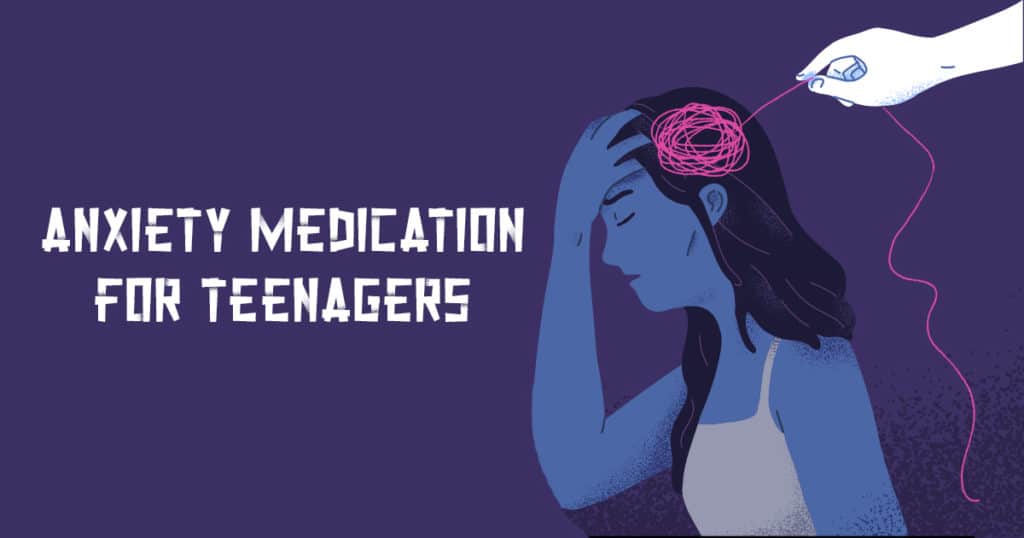Is anxiety medication for teens safe?
The question is one many parents may have, particularly as rates of anxiety in teens have been rising in recent years. There are safe choices if a teen needs medication for anxiety and depression, but it’s up to their treatment provider to decide what will work best for them. This is true of anxiety and antidepressant medications and treatment for any medical condition.
Below, we discuss anxiety medication for teens and the different available options for treating anxiety disorders outside of medicine.
Anxiety in Teens
Anxiety in teens can look different than it does in children. As teens get older, they tend to worry more about themselves, whereas children worry about things they’re afraid of or something happening to the people they love.
For teens, the worry and anxious feelings they get may center around not performing well in school or sports, or what other people think about them. Their bodies and appearance can be familiar sources of anxious thoughts in their teen years.
For anxious teens, they’ve perhaps struggled with symptoms for a long time, but maybe they’re getting worse. In other cases, someone who wasn’t previously anxious will start experiencing symptoms when they’re a teen.
Specifically, panic disorders and social anxiety disorders often begin in the teenage years. Generalized anxiety disorder can become apparent as well.
It’s sometimes difficult to notice symptoms in teenagers because they hide their feelings, or mental health symptoms can easily be confused with “typical” teen behavior.
Chronic anxiety often leads to symptoms of depression. When a young person avoids things in their life or constantly worrying, it erodes their sense of well-being. A young person struggling with anxious thoughts or symptoms may disengage from something in their life, causing worsening depression.
Symptoms of anxiety that teenagers may exhibit include:
- Ongoing worries about normal parts of everyday life
- Irritability
- Problems with concentration
- Extreme sensitivity to criticism
- Withdrawing from social activities
- Avoiding new things or situations
- Physical symptoms and complaints like headaches or stomachaches
- Declines in school performance
- Seeking reassurance constantly
- Sleep issues
- Substance abuse
Which Types of Medicines Are Prescribed to Teens?
Selective serotonin reuptake inhibitors (SSRIs) are the most often prescribed medications for children and teens. These medicines work by blocking serotonin’s reabsorption. Serotonin is a neurotransmitter responsible for regulating fear, stress, and worry in the brain.
Lexapro for anxiety is one standard option that’s an effective treatment, as is Prozac for anxiety. Other SSRIs are the anti-anxiety medication Celexa and Zoloft.
It can take around six weeks for these medicines to start work. If a teen takes medication and the results aren’t where their provider would like them to be, or they have some common side effects that don’t seem to lessen, the dose may increase or they may switch types.
Benzodiazepines are less commonly given to teens with severe anxiety or panic attacks.
- These drugs include Xanax and Valium.
- These treatments have a potential for abuse and dependence, so they’re only meant for short-term use.
- These medicines can also cause other adverse effects like withdrawal symptoms.
Hydroxyzine is an antihistamine that’s a non-traditional, as-needed treatment for anxiety.
- Hydroxyzine can help with anxiety’s primary symptoms and help with insomnia.
- Unlike benzodiazepines, it’s not a controlled substance.
- Hydroxyzine doesn’t have a risk of addiction like Xanax and similar medications.
Beta-blockers for anxiety can help control the fight-or-flight response that many people get when they experience anxiety and panic.
- These medicines primarily help physical symptoms like high blood pressure.
- Beta-blockers for anxiety is an off-label use.
- Beta-blockers are traditionally used to treat heart conditions like an irregular heart rate following heart attacks or to treat heart failure.
- Off-label, they can be helpful in the management of anxiety symptoms.
- Beta-blockers are also known as beta-adrenergic agents, which prevent adrenaline from contacting the beta receptors of your heart.
- Beta-blockers are a prescription drug that can relax your blood vessels and reduce blood pressure.
- Propranolol and atenolol are two specific beta-blockers frequently prescribed off-label to help treat anxiety.
Prescribing something off-label means that even though the medicine has approval from the FDA for one purpose, it can be for other purposes too. The FDA regulates how drugs are tested and approved, but not how doctors use them to treat patients. If they think it’s the best choice, some mental health professionals can prescribe an off-label treatment for anxiety or other mental disorders.
Treating Anxiety in Teens
The first line of treatment for anxiety symptoms in young people and teens is often therapy. More specifically, cognitive-behavioral therapy or CBT is an option. CBT teaches anxious kids and teens to think differently about their feelings and respond to them differently.
CBT aims to help participants learn how to tolerate their anxiety and reframe their perspective instead of avoiding everything that triggers it. Then, over time they learn that it diminishes.
During CBT, a counselor or therapist may work with a teen to gradually increase their exposure to activities or things they fear. This type of CBT is more specifically known as exposure therapy.
Is Medication Safe for Teens?
Prescription medicines are frequently part of treatment plans for anxiety disorders, and medication can be used along with CBT when approved by a doctor.
Research shows that a combination of CBT and medicine works better than either alone for children. However, in situations with a teen who has mild to moderate functional impairment, the American Academy of Child and Adolescent Psychiatry recommends against the use of medication.
In some circumstances, a treatment provider may feel the benefits of medication for anxiety and depression outweigh the possible risks.
FDA Warnings
The Food and Drug Administration (FDA) issued a warning in 2004. The warning indicates some of the medicines used to treat anxiety disorders, including SSRIs and SNRIs, may increase suicidal thoughts or behaviors in young people. The risk of Lexapro for anxiety or Prozac for anxiety as examples of causing suicidal thoughts or behaviors is rare.
No suicides were reported in the studies that led to the warnings. However, the rate of suicidal thinking or behavior was 4% in clinical trials among patients receiving the medications compared with 2% receiving a placebo.
There are critics of the black box warning regarding the risk of suicide.
Those against it feel that it could lead some people not to get the medication they need because they fear they’re unsafe. When teens take prescription medication for mental health conditions, they are monitored for symptoms and have frequent appointments with their care provider.
Their health care provider will talk with them about the potential side effects and determine if there should be adjustments to dosage or the type of medication.
“How do I get Help for my Teen’s Anxiety?”
Parents often wonder if there is an over-the-counter anxiety medication to help their teen.
There aren’t over-the-counter medicines or herbal remedies that are as potent as a prescription, but there are some natural anxiety solutions you can look into. Talk to your teen’s doctor before trying any dietary supplement or OTC option to ensure it won’t cause drug interactions or create any adverse effects.
We encourage you to contact Hillside Horizon for Teens by calling 855-746-8378 if you’d like to learn more about the treatment of generalized anxiety disorder and social anxiety disorder in teens, as well as other mental health disorders.




